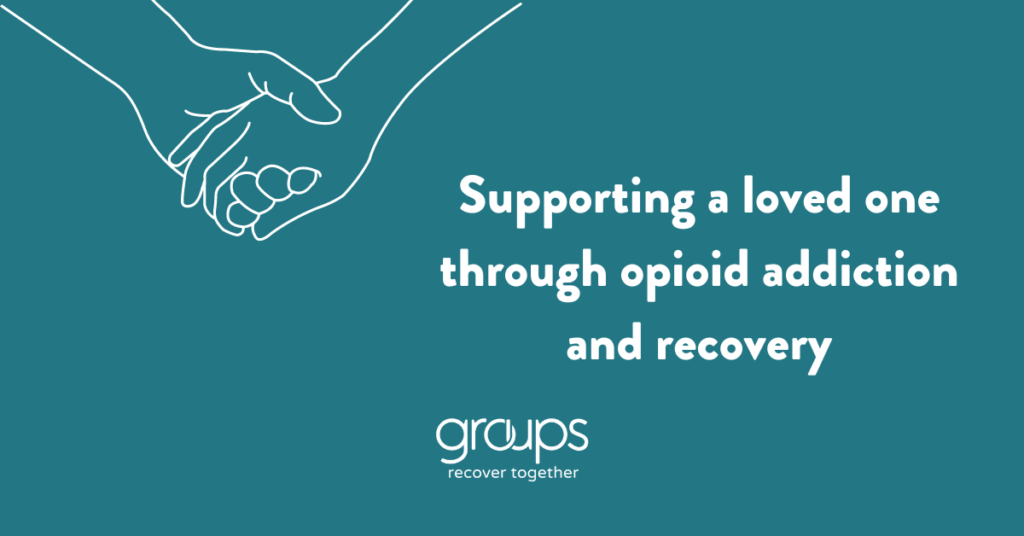If someone you love is in recovery, here’s how to support them and leave space for self-care.
If someone you love is recovering from opioid addiction, it’s understandable to have questions. How can you best support them? What do you need to know about their experience? Are there ways for you to feel supported, too?
We reached out to Groups Recover Together staff for their advice on supporting loved ones in recovery. Here’s what they had to say — plus resources to help you be the best support person you can be.
1. Understand that a recovery journey is just that: a journey.
Kentucky-based Clinical Supervisor Ashley Metzger says to remember that recovery is a journey. It has “ups, downs, starts, stops, and likely with no end destination,” Ashley says. “It’s definitely an adventure of a journey, not a smooth process.”
Maine-based Groups Office Manager Manny Reis compares recovery to walking for the first time. “They may fall a few times,” Manny says. “Just make yourself available to pick them up and support them until they seem stable on their own.”
The recovery journey can also be difficult for loved ones. “Trying to support a family member in recovery is also kind of like a grief journey,” says Recovery Support Specialist Supervisor DeJai Trosper. Hold space for your own grief so you can process it on your own.
2. Lead with empathy and understanding.
“I don’t think we truly know how isolating addiction can be,” DeJai explains. “Most importantly, those who are fighting need to feel loved.”
Have “strong amounts of patience and resources at the ready,” Ashley suggests. Maine-based Peer Recovery Coach Stephanie Roberts says to “listen without judgment and offer unconditional love and support.” Stephanie also says to “celebrate milestones” and “encourage healthy coping strategies.”
It’s important to remember not to bring up hurtful things from the past. “No one, especially someone facing their fear of recovery, needs reminding of past deeds,” explains Ohio-based Recovery Consultant Brenda Banet. “No one knows someone better than they do themselves.”
Nurse Practitioner Sam Polk suggests “understanding and allowing yourself to be frustrated at times, but not taking it out on your loved one.” Do what you need to do to be supportive and available.
3. Ask what specific support they want and need.
“Open communication is vital to understanding how a loved one best feels supported,” says Kentucky-based Counselor Marguerite Boone. “Addiction recovery is not a one-size-fits-all approach. Some may benefit from you attending support groups with them, some may benefit from you reading about medication options to educate yourself.” Regardless, adds Marguerite, “non-judgmental support is something that’s easy to offer. But it still makes a lasting and meaningful impact.”
Clinical Supervisor Melanie Hayden explains that “it is important to involve the loved one in conversation.” They need to “have autonomy in the recovery process.” This can include “working together on setting rules, boundaries, goals, and how to support them.” “Addiction often feels powerless. Give the loved one some power back by motivating them to voice what their specific needs are,” adds Marguerite.
Manny agrees: “Never make assumptions. Ask your loved one directly: ‘What do you need from me to help you?’” Manny explains. “When we assume instead of using open communication, we can do more harm than good. Even if we are well-intended,” Marguerite says.
Start with a “questionnaire asking what areas they need the most support in,” offers West Virginia-based Counselor Kayla Harness. Even if your loved one doesn’t know the answers yet, they’ll know you’re there for them.
While you ask questions, always remember to listen.
4. Educate yourself about addiction and recovery.
“Gathering information about addiction and understanding the recovery process and journey is important,” explains Tennessee-based Counselor Janice Church.
“Learning about addiction helps you better understand your loved one’s disease and what they are going through, which is the first step to helping them,” Stephanie says. “Try to show them how much you care and are willing to support them.”
However, Marguerite suggests, “be willing to educate yourself to ease the burden on the loved one in recovery from doing much of this legwork.”
Groups staff recommends leaning on some of the following resources for education:
- Talking to loved ones with similar experiences
- Recovery support groups
- Social media support groups
- Community treatment centers
- Local health fairs
- SAMHSA
- The National Institute of Drug Abuse
5. Remember to take care of yourself.
Your health and wellness matter, too. You can take care of yourself by joining a family support group like:
- Al-Anon
- Alateen
- Families Anonymous
- GRASP
- NAMI Family Support Groups
- Nar-Anon
- Parents of Addicted Loved Ones
- SMART Recovery Family & Friends
About Groups Recover Together
Groups is a leading opioid use disorder (OUD) treatment provider. Our caring team can help members get through withdrawal with medication and build long-term recovery through community.
Groups members meet weekly with peers and trained counselors. They also get support for goals beyond recovery. We can help with housing, health care, food, jobs, school, transit, and more.
We believe that anyone who wants treatment should be able to get it. Groups accepts most insurance and Medicaid plans and can support uninsured folks.
Know someone Groups might be right for? We’re available 24/7 at (888) 858-1723.




